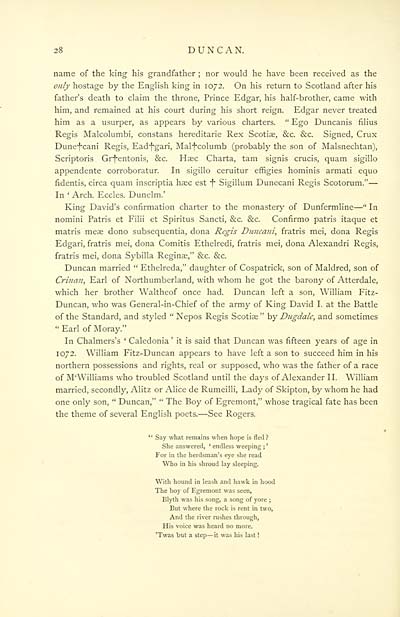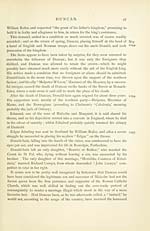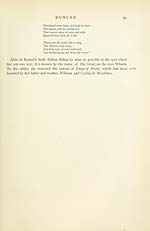Family records of the Bruces and the Cumyns
(40) Page 28
Download files
Complete book:
Individual page:
Thumbnail gallery: Grid view | List view

28 DUNCAN.
name of the king his grandfather ; nor would he have been received as the
only hostage by the English king in 1072. On his return to Scotland after his
father's death to claim the throne, Prince Edgar, his half-brother, came with
him, and remained at his court during his short reign. Edgar never treated
him as a usurper, as appears by various charters. " Ego Duncanis filius
Regis Malcolumbi, constans hereditarie Rex Scotiae, &c. &c. Signed, Crux
Dunefcani Regis, Eadfgari, Malfcolumb (probably the son of Malsnechtan),
Scriptoris Grfentonis, &c. Hsec Charta, tarn signis crucis, quam sigillo
appendente corroboratur. In sigillo ceruitur effigies hominis armati equo
fidentis, circa quam inscriptia hasc est *f" Sigillum Dunecani Regis Scotorum." —
In ' Arch. Eccles. Dunelm.'
King David's confirmation charter to the monastery of Dunfermline — " In
nomini Patris et Filii et Spiritus Sancti, &c. &c. Confirmo patris itaque et
matris mese dono subsequentia, dona Regis Duncaui, fratris mei, dona Regis
Edgari, fratris mei, dona Comitis Ethelredi, fratris mei, dona Alexandri Regis,
fratris mei, dona Sybilla Reginae," &c. &c.
Duncan married " Ethelreda," daughter of Cospatrick, son of Maldred, son of
Crinan, Earl of Northumberland, with whom he got the barony of Atterdale,
which her brother Waltheof once had. Duncan left a son, William Fitz-
Duncan, who was General-in-Chief of the army of King David I. at the Battle
of the Standard, and styled " Nepos Regis Scotia; " by Dugdalc, and sometimes
" Earl of Moray."
In Chalmers's ' Caledonia ' it is said that Duncan was fifteen years of age in
1072. William Fitz-Duncan appears to have left a son to succeed him in his
northern possessions and rights, real or supposed, who was the father of a race
of M Williams who troubled Scotland until the days of Alexander II. William
married, secondly, Alitz or Alice de Rumeilli, Lady of Skipton, by whom he had
one only son, " Duncan," " The Boy of Egremont," whose tragical fate has been
the theme of several English poets. — See Rogers.
"Say what remains when hope is fled ?
She answered, ' endless weeping ; '
For in the herdsman's eye she read
Who in his shroud lay sleeping.
With hound in leash and hawk in hood
The boy of Egremont was seen,
Blyth was his song, a song of yore ;
But where the rock is rent in two,
And the river rashes through,
His voice was heard no more.
'Twas but a step — it was his last !
name of the king his grandfather ; nor would he have been received as the
only hostage by the English king in 1072. On his return to Scotland after his
father's death to claim the throne, Prince Edgar, his half-brother, came with
him, and remained at his court during his short reign. Edgar never treated
him as a usurper, as appears by various charters. " Ego Duncanis filius
Regis Malcolumbi, constans hereditarie Rex Scotiae, &c. &c. Signed, Crux
Dunefcani Regis, Eadfgari, Malfcolumb (probably the son of Malsnechtan),
Scriptoris Grfentonis, &c. Hsec Charta, tarn signis crucis, quam sigillo
appendente corroboratur. In sigillo ceruitur effigies hominis armati equo
fidentis, circa quam inscriptia hasc est *f" Sigillum Dunecani Regis Scotorum." —
In ' Arch. Eccles. Dunelm.'
King David's confirmation charter to the monastery of Dunfermline — " In
nomini Patris et Filii et Spiritus Sancti, &c. &c. Confirmo patris itaque et
matris mese dono subsequentia, dona Regis Duncaui, fratris mei, dona Regis
Edgari, fratris mei, dona Comitis Ethelredi, fratris mei, dona Alexandri Regis,
fratris mei, dona Sybilla Reginae," &c. &c.
Duncan married " Ethelreda," daughter of Cospatrick, son of Maldred, son of
Crinan, Earl of Northumberland, with whom he got the barony of Atterdale,
which her brother Waltheof once had. Duncan left a son, William Fitz-
Duncan, who was General-in-Chief of the army of King David I. at the Battle
of the Standard, and styled " Nepos Regis Scotia; " by Dugdalc, and sometimes
" Earl of Moray."
In Chalmers's ' Caledonia ' it is said that Duncan was fifteen years of age in
1072. William Fitz-Duncan appears to have left a son to succeed him in his
northern possessions and rights, real or supposed, who was the father of a race
of M Williams who troubled Scotland until the days of Alexander II. William
married, secondly, Alitz or Alice de Rumeilli, Lady of Skipton, by whom he had
one only son, " Duncan," " The Boy of Egremont," whose tragical fate has been
the theme of several English poets. — See Rogers.
"Say what remains when hope is fled ?
She answered, ' endless weeping ; '
For in the herdsman's eye she read
Who in his shroud lay sleeping.
With hound in leash and hawk in hood
The boy of Egremont was seen,
Blyth was his song, a song of yore ;
But where the rock is rent in two,
And the river rashes through,
His voice was heard no more.
'Twas but a step — it was his last !
Set display mode to:
![]() Universal Viewer |
Universal Viewer | ![]() Mirador |
Large image | Transcription
Mirador |
Large image | Transcription
Images and transcriptions on this page, including medium image downloads, may be used under the Creative Commons Attribution 4.0 International Licence unless otherwise stated. ![]()
| Histories of Scottish families > Family records of the Bruces and the Cumyns > (40) Page 28 |
|---|
| Permanent URL | https://digital.nls.uk/95071466 |
|---|
| Description | A selection of almost 400 printed items relating to the history of Scottish families, mostly dating from the 19th and early 20th centuries. Includes memoirs, genealogies and clan histories, with a few produced by emigrant families. The earliest family history goes back to AD 916. |
|---|

